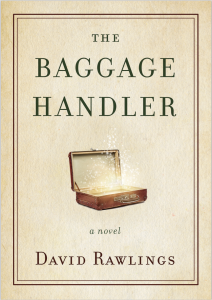by David Rawlings, @DavidJRawlings
The big lesson in being a debut novelist
My debut novel launched recently. Among the tears, excitement, nerves and sense of satisfaction was a lesson that I’ve learned over the nine months it’s taken The Baggage Handler to go from Word document stored on my computer to an actual book I can hold in my hands.
This is the lesson: how to balance all the feedback.
Publishing my debut novel has given me flashbacks to when our eldest child was born. The reaction to those early minutes, days and months of my son’s life actually reflected the emotion I’ve felt about the arrival of my debut novel – tears, excitement, nerves and a sense of satisfaction.
We brought my son home, then the first piece of criticism came. And it hurt. Not because the criticism was harsh, or that I knew deep down it was right, but because it was critical of something that was a part of me. Something I had created. What I had to learn – as all new parents have to learn – is how to handle comments or criticism that come your way. Which ones to listen to. Which ones might be helpful. Which ones to let flow over you without landing.
I’ve been dealing with professional criticism my whole life. As a copywriter, I’ve had to deal with people’s opinions on whether they like something I’ve written or not. We work in a very subjective field, where there are no definitive answers, just shades of opinionated grey about what is good and what isn’t. I regularly hear differing opinions about the same piece of text – some love it, some are ambivalent, some dislike it and think they could do better. That’s normal.
But with my parenting – which is also subjective – it wasn’t that easy. That brings me back to my debut novel. Even though I’ve had 28 years of handling criticism, and 17 as a parent, I had to learn how to handle criticism when it came to my fiction. There are three things I’ve learned:
The 5-star reviews v the 1-star reviews
There is a real temptation to embrace the 5-star reviews and ignore the 1-star reviews. I went through a process where I had two 2-star reviews in a row and started to second-guess myself. Then another review came in – 5-star – and suddenly I felt on top of the world again.
Neither of those responses was healthy. This is not the way to handle it. Here’s a conundrum: the reviewer who gave me 5-stars, and the reviewer who gave me 1-star are both right. They did or didn’t engage with the story. Based on their reading of it.
The lesson? To not look at reviews in isolation. Identify trends, and act on those. If all of your reviews of 3-stars and below all talk about the same thing (ie your characters don’t work or your phrasing is clumsy or your story is a step beyond being believable) then there might be something in it.
The reader who gets it v the reader who doesn’t
Following on from the first lesson is how we perceive those people who either like or don’t like the book. A 5-star reviewer isn’t necessarily someone who “gets it”. A 1-star reviewer can’t just be discounted as someone who doesn’t.
You can tend to form an echo chamber around you, where only those opinions from those who “get it” become valid. That’s a fine balance for a writer, where we always need to find the challenge to improve our writing but have fragile self-esteem about what we’re currently writing.
The lesson? Don’t turn feedback into a personal thing. It seems a modern way of handling disagreements – disregard the opinion you disagree with by somehow labeling the opinion-giver – but it’s not helpful in the longer-term for you and your writing. You need dissenting voices to keep challenging you to write better, cleaner or deeper.
The way people give you feedback
The last lesson is to manage the way people give you feedback. I drew from my corporate experience in terms of handling feedback in this way. Many years ago, I changed my language when it comes to getting input or feedback to my corporate writing. I introduced this word: why? If someone “liked’ my advertising campaign … why? If someone didn’t “like” my brochure copy … why? This helps remove the subjectivity as it goes beyond like/dislike into whether or not they engaged.
So wherever I can, I ask people why. That’s hard to do when someone rates your story as two stars but doesn’t leave anything else for you to work on. I file that one away and don’t stew over it.
Also, I’ve found a real frustration in getting a rave review alongside 3.5 stars. I started to question how a book could be amazingly brilliant and yet only get 70% approval.
The lesson? You can’t control HOW people give you feedback. You can offer them advice on what’s helpful for you (as I did with my corporate clients) but you can’t control it. It can be frustrating, but that’s the nature of the industry. So ask why. Try to find out what’s going on being the feedback if you can.
So these are lessons I learned – and am still learning. What are your biggest challenges in handling feedback to your writing?
 David Rawlings is a based in South Australia, a sports-mad father-of-three who loves humor and a clever turn-of-phrase. Over a 25-year career he has put words on the page to put food on the table, developing from sports journalism and copywriting to corporate communication. Now in fiction, he entices readers to look deeper into life with stories that combine the everyday with a sense of the speculative, addressing the fundamental questions we all face.
David Rawlings is a based in South Australia, a sports-mad father-of-three who loves humor and a clever turn-of-phrase. Over a 25-year career he has put words on the page to put food on the table, developing from sports journalism and copywriting to corporate communication. Now in fiction, he entices readers to look deeper into life with stories that combine the everyday with a sense of the speculative, addressing the fundamental questions we all face.
His debut novel – The Baggage Handler – hit the shelves in March 2019 and is available where all good books are sold! Books: http://books2read.com/Baggage ~ Website: www.davidrawlings.com.au ~ Facebook: David Rawlings – Author ~ Instagram: davidrawlingsauthor ~ Twitter: @DavidJRawlings



Comments 2
Thank you for sharing your hard-won wisdom, David. I especially appreciate your advice about asking why. And congratulations on the release of your first book!
Thanks Katie. Why is such a small word, but so powerful.
Cheers, David